INTERNATIONAL DAY TO END IMPUNITY FOR CRIMES AGAINST JOURNALISTS
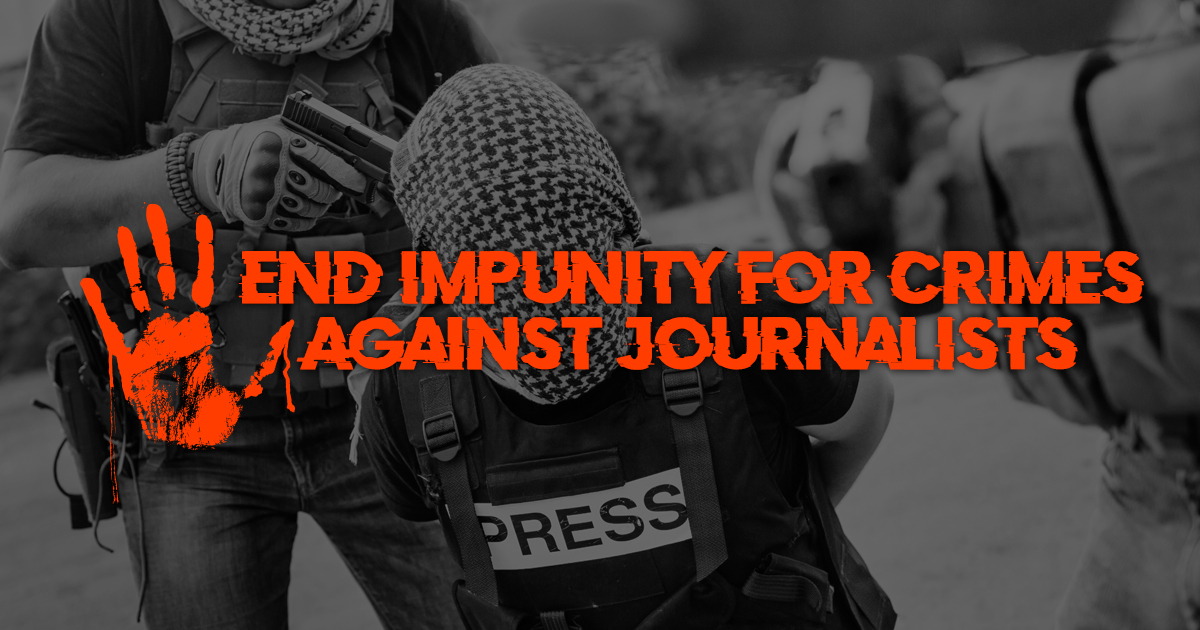
30 CASES OF IMPUNITY FOR MURDERS OF JOURNALISTS IN EUROPE
On November 2, the Council of Europe’s Safety of Journalists Platform launches the website highlighting 30 cases of impunity for murders of journalists in Europe, including cases of Anna Politkovskaya, Aleh Byabenin, Georgiy Gongadze, Mikhail Beketov, Pavel Sheremet and others. Journalistic investigations of some of these and many other murders of independent journalists were funded by the JFJ Grant Programme.
Parties to the European Convention on Human Rights have an obligation to carry out effective investigations into attacks perpetrated against journalists. Alerts submitted on the Safety of Journalists Platform reflect concerns about the cases in which these obligations may not have been met. Several cases concern the Russian Federation and Belarus, which are not Council of Europe member states but are bound by the International Covenant on Civil and Political Rights and other international obligations.
“Journalists who investigate and report on corruption, abuse of power and human rights violations are still being killed in Europe today. Too often, these crimes go unpunished,” said Marija Pejčinović Burić, Secretary General of the Council of Europe.
EVENTS AND ADVOCACY
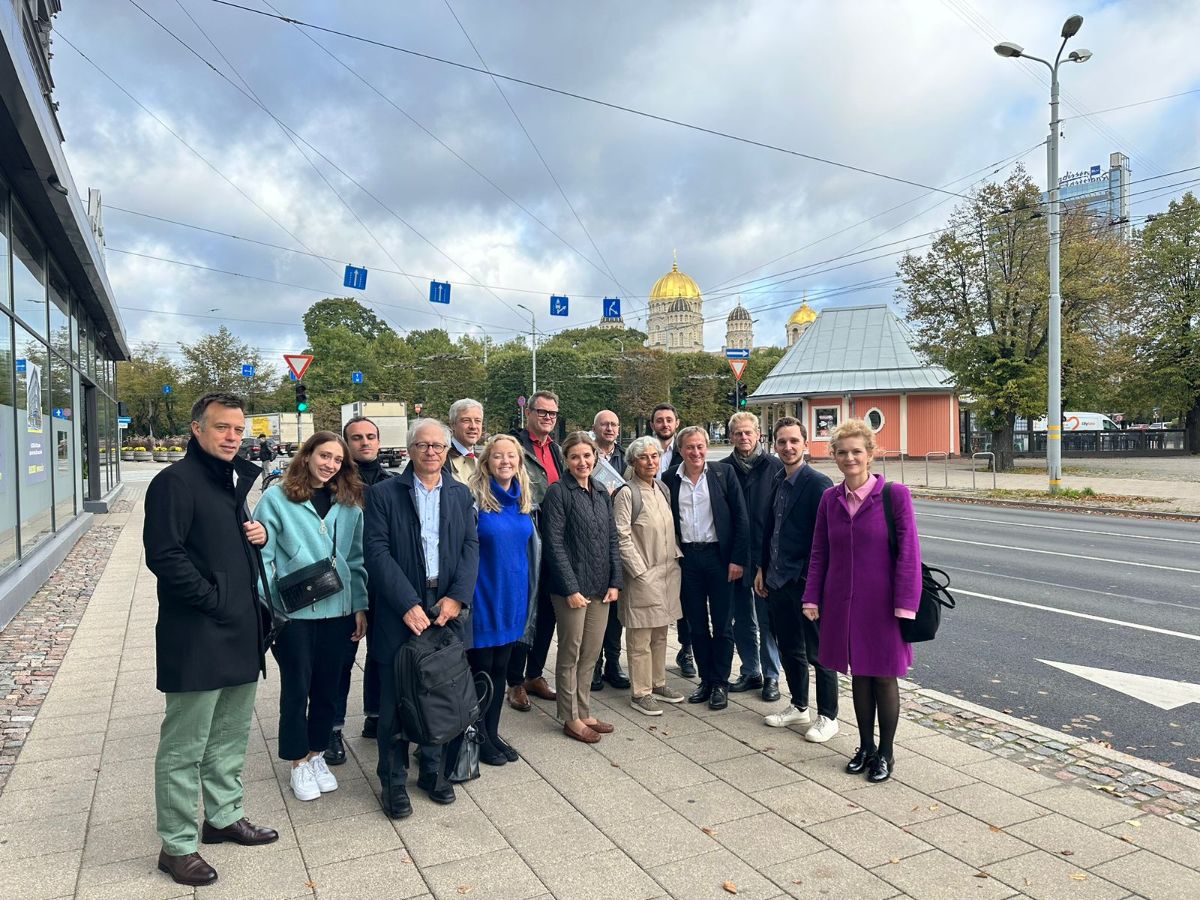
- On October 3-4, JFJ’s Director Maria Ordzhonikidze participated in the annual meeting of the Council of Europe’s Safety of Journalists Platform in Riga, Latvia. JFJ was among 15 partner organisations who worked over two days to meet local media organisations, fine-tune the methodology of alerts, draft the structure for the upcoming Annual report and devise the strategy for enhancing the Platform work’s visibility to advocate better safety of journalists in the CoE member states.
- On October 4-5, JFJ, in partnership with the Norwegian Helsinki Committee and People in Need, organised two side events during the Warsaw Human Dimension Conference. Following events, JFJ has issued a statement calling on authorities of Azerbaijan, Belarus, Kazakhstan, Kyrgyzstan, Russia, Tajikistan, Turkmenistan and Uzbekistan to release the imprisoned journalists and bring their laws and practices into compliance with international commitments.
- JFJ released preliminary results of the expert survey among over 100 Russian-speaking media workers forced to relocate to safer countries. Almost half of those surveyed have been facing threats even in their new home countries: 23% faced indirect threats: calls, messages, oral warnings; 14% – direct threats to life, well-being and liberty, and 10% – surveillance, hacking and other cyber-attacks. Read the full statement and survey findings.
- On October 5-6, JFJ’s Director participated in The Pen is Mightier than the Sword? Meeting Today’s Challenges to Freedom of Expression and the Safety of Journalists conference, organised in the framework of the Latvian Presidency of the Committee of Ministers of the Council of Europe jointly with the Council of Europe. The conference was preceded by the launch of the Campaign for the Safety of Journalists. Both events focused on the challenges to freedom of expression and the safety of journalists, including in times of conflict and hybrid war.
- On October 11-12, Ms. Ordzhonikidze participated in the ACOS Alliance Annual Safety Coordination Meeting in New York. As part of the meeting, Ms. Ordzhonikidze conducted a workshop on risk assessment and the type of risks that independent media face worldwide. The ACOS Alliance is a global coalition of 150+ news organizations, journalist associations, and press freedom NGOs working together to champion safe and responsible journalism practices.
- On October 19-20, JFJ attended the Trust Conference by the Thomson Reuters Foundation in London, UK. This year’s conference focused on journalism in exile, legal and cyber threats to media freedom, and the role of the law in securing climate justice and delivering social impact via sustainable practices.
- On October 30, journalists and representatives of media freedom organisations from across the UK, including JFJ, gathered at 10 Downing Street for a special reception with the Culture Secretary to celebrate their contribution to the UK democracy. Culture Secretary Lucy Frazer launched a refreshed National Action Plan for the Safety of Journalists, introducing new measures to protect journalists from harm and building on previous pledges to create a safe environment for them to operate. It follows the launch of a new dedicated task force in September to tackle Strategic Lawsuits Against Public Participation (SLAPPs), increasingly used by wealthy individuals to intimidate or silence journalists from reporting information in the public interest.
STRATEGIC LAWSUITS AGAINST PUBLIC PARTICIPATION (SLAPPs)
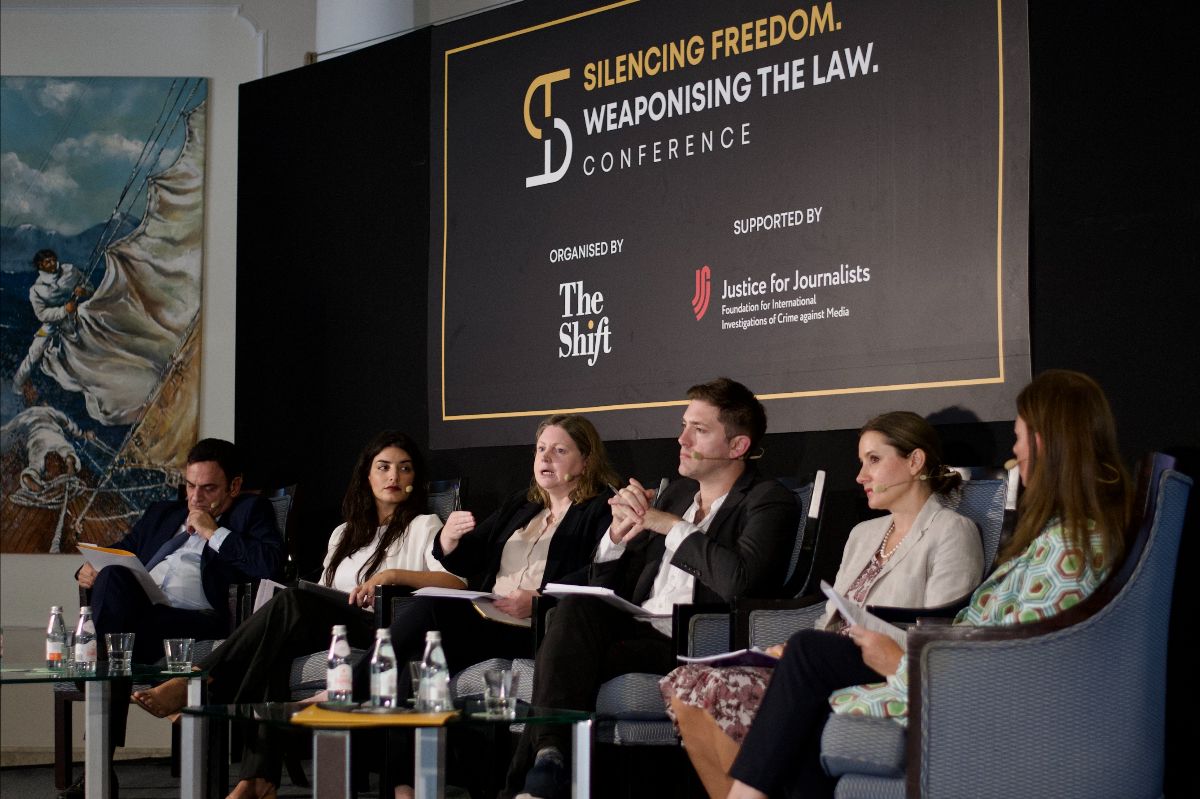
- On October 23, the OSCE Representative on Freedom of the Media, Teresa Ribeiro, concluded a two-day official visit to London. One of the central topics during Ribeiro’s visit was the safety of journalists, including the United Kingdom’s national action plan. The discussions also touched upon the ongoing efforts within the UK to combat legal harassment and Strategic Lawsuits Against Public Participation (SLAPPs) through a set of anti-SLAPP measures.
- On October 27, The UK Anti-SLAPP Coalition welcomed the passage of the Economic Crime and Corporate Transparency Act (ECB2), which includes the first anti-SLAPP provision in the UK law. While this is undoubtedly a landmark moment, it is limited to those speaking out on economic crime. JFJ welcomes this important step towards stamping out Strategic Lawsuits Against Public Participation (SLAPPs), but still, a lot remains to be done to provide universal protection from SLAPPs.
- On October 27, The Shift News, with the support of the Justice for Journalists Foundation, held Silencing Freedom. Weaponising the Law conference in Malta. The panellists, who included Caoilfhionn Gallagher, Matthew Caruana Galizia, David Casa, Flutura Kusari and other prominent media freedom advocates, discussed the weaponisation of legislation against journalists, its consequences and the state of journalism and media freedom in Europe. JFJ’s Director Maria Ordzhonikidze participated in the panel discussion about the lawfare and provided closing remarks to the conference, saying: “The moment we stop talking about something, the issue disappears. By building awareness and educating the public about the nature of SLAPPs, we move forward.”
UK ANTI-SLAPP CONFERENCE ‘TRACKING IMPLEMENTATIONS’
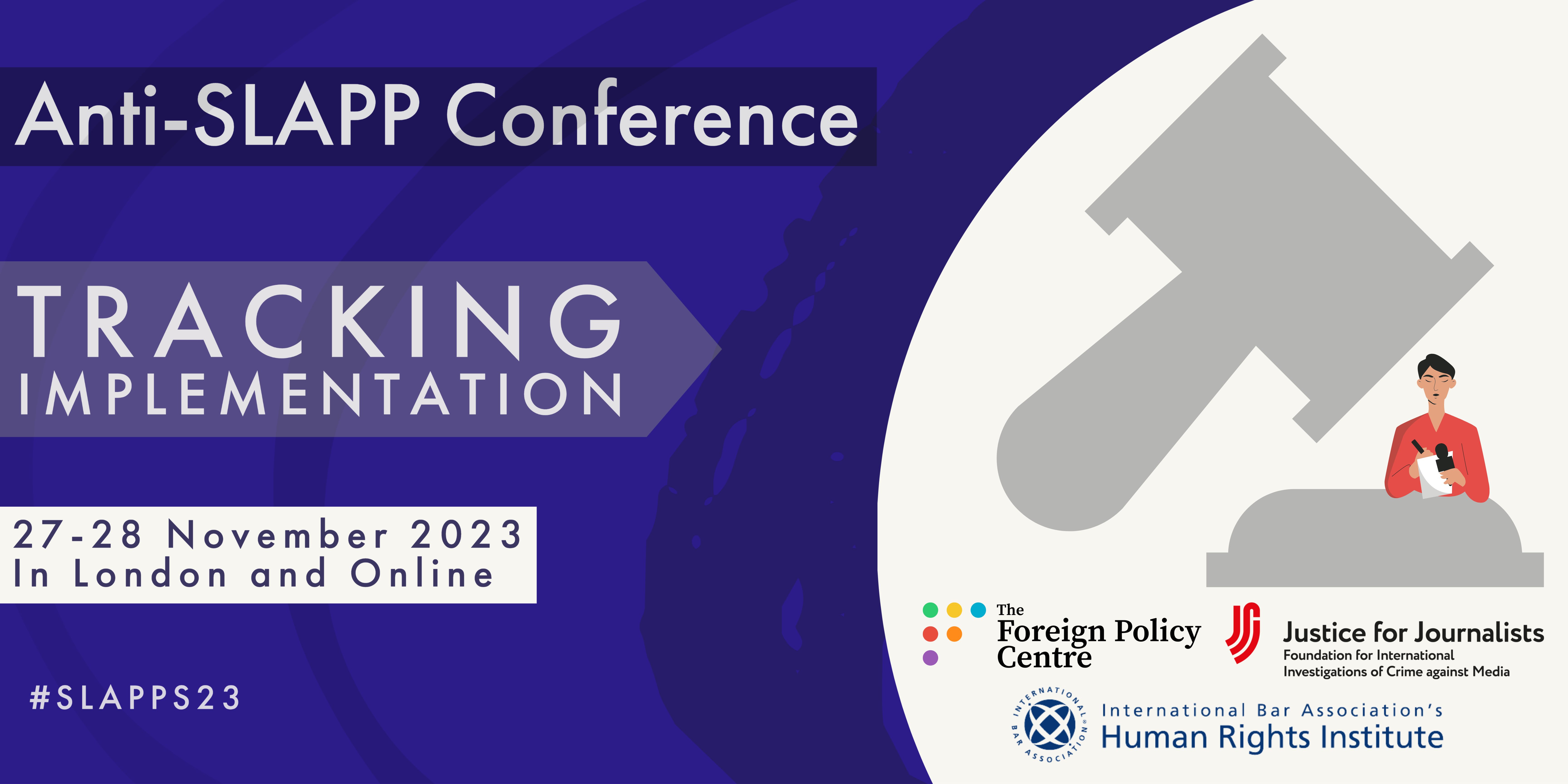
The Foreign Policy Centre (FPC), the Justice for Journalists Foundation (JFJ) and the International Bar Association’s Human Rights Institute (IBAHRI) are pleased to announce the third edition of the UK Anti-SLAPP Conference to be held on Monday 27 and Tuesday 28 November 2023, both online and in-person in London. The information about speakers and programme is available on the conference website.
UNIVERSAL PERIODIC REVIEW SUBMISSIONS
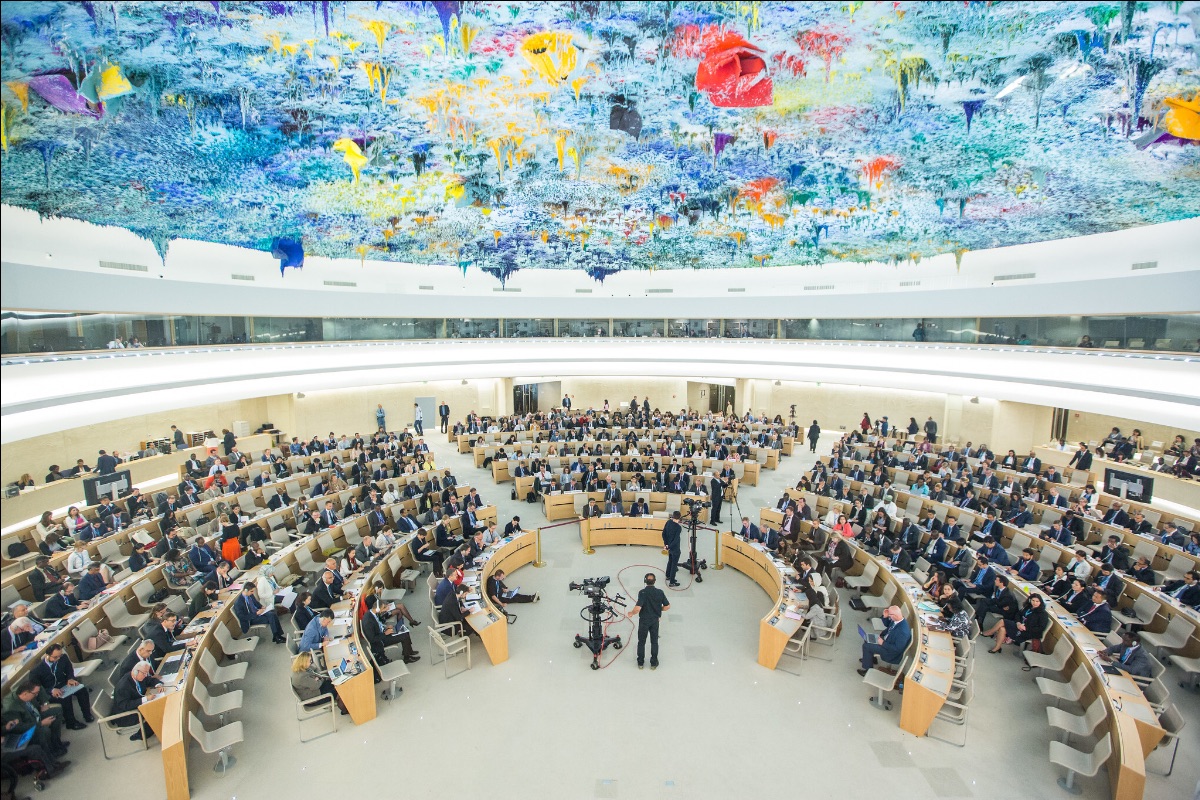
Together with our partner, Media Rights Group (Azerbaijan), the Justice for Journalists Foundation has contributed to the Universal Periodic Review (UPR) of Azerbaijan. Several recommendations were included in the summary of stakeholders’ submissions under the section Fundamental freedoms and the right to participate in public and political life.
Together with Turkmen News, JFJ also contributed to the UPR of Turkmenistan. Recommendations provided were included in the summary of stakeholder’s submissions. Together with OVD Info, Access Now and Article 19, JFJ also contributed to the Universal Periodic Review (UPR) of the Russian Federation. Several recommendations were included in the summary of stakeholder’s submissions.
An individual contribution was also submitted to the UPR of Uzbekistan. Among contributions added to the summary of the stakeholder’s submission were those related to the institutional infrastructure and policy measures; fundamental freedoms and the right to participate in public and political life; scope of international obligations and cooperation with human rights mechanisms. Through the UPR, the Human Rights Council will review, on a periodic basis, the fulfilment by each of the 193 United Nations Member States of their human rights obligations and commitments.
REPORTS
The Justice for Journalists Foundation and its partners released annual reports about attacks on media workers in Moldova and Tajikistan in 2022.

In Moldova, non-physical and cyber-attacks and threats (67% of all attacks) remained the main method of pressure on media workers. 2022 saw a large number of DDOS attacks against online resources, as well as unwarranted blocking and attempts to hack the social media accounts of investigative journalists. For the first time in the country’s history, a court ordered that a manager of a media outlet (Val Butnaru, Jurnal TV) be deprived of the right to hold management positions in the media for six months in a case of alleged defamation.
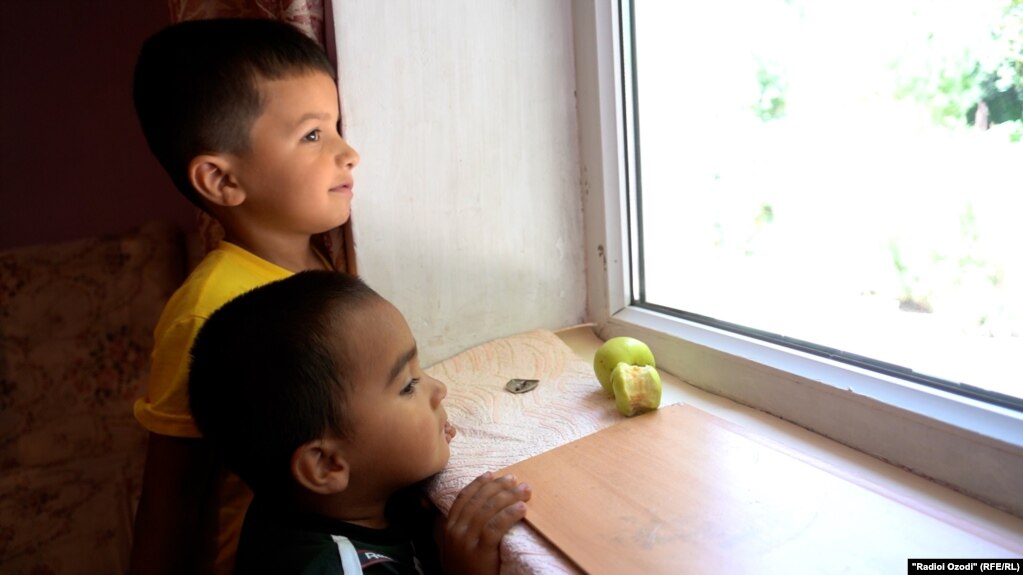
In Tajikistan, the number of attacks on media workers in 2022 has been unprecedented over the past decade – it increased fivefold compared to 2017. At least 61 incidents were committed by the authorities via abuse of the legislation. Eight of these cases resulted in lengthy prison sentences for journalists, ranging from seven to 21 years in prison. Slander against journalists and bloggers on both state media outlets and anonymous social media channels continued in 2022.
